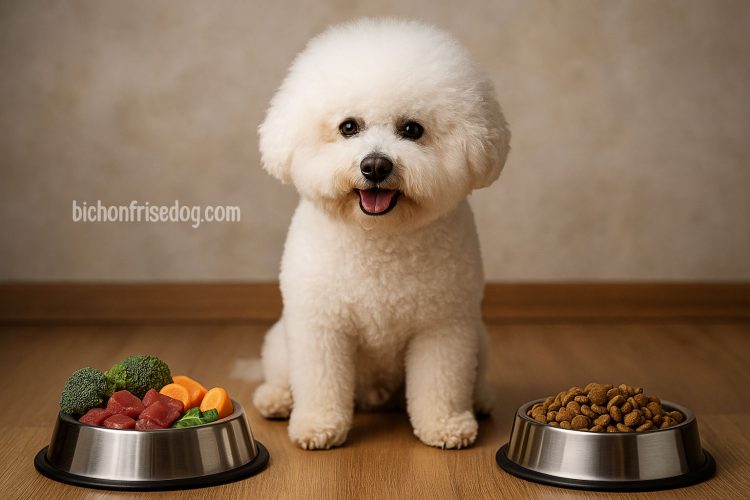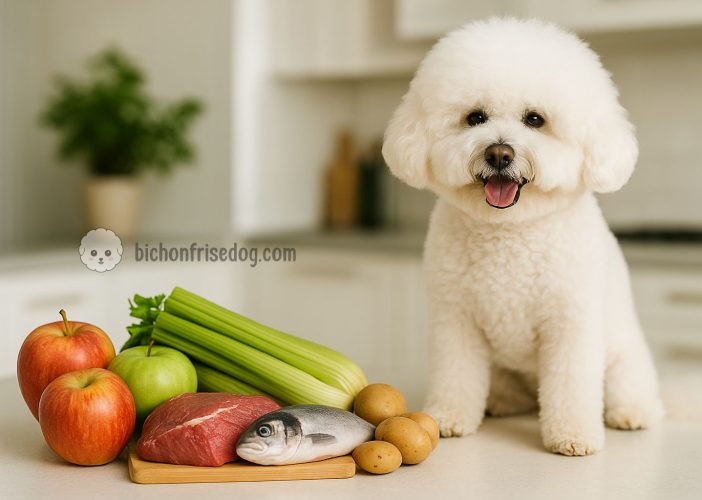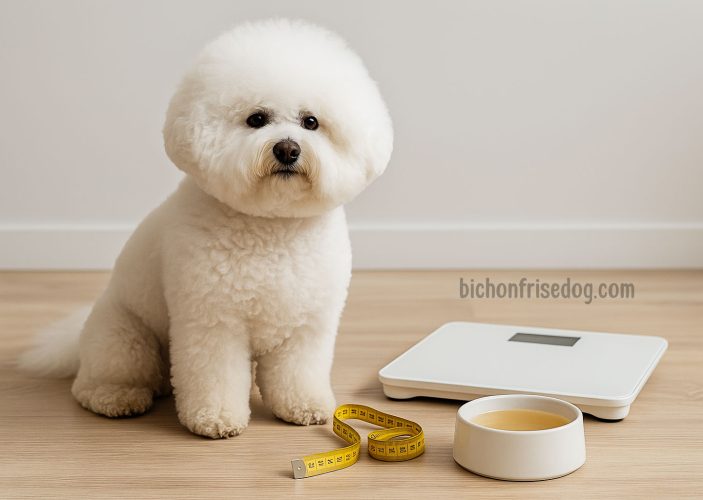If you’re wondering what is the best dog food for a Bichon Frise, you’re not alone. This small, fluffy breed is known for its charming personality and sensitive health, especially when it comes to skin conditions, liver health, and digestion.
As someone who has raised Bichon Frises for over a decade, I’ve learned that nutrition plays a critical role in their overall well-being and longevity. I used to believe that premium kibble or canned food was the best I could offer but after facing serious health issues with my dogs, I realized that homemade food was the key to helping them thrive.

🥣 Why diet matters so much for a Bichon Frise
According to veterinary nutritionists, highly processed foods, like many store-bought kibble and canned diets, are often low in bioavailable protein, and high in sodium, carbohydrates, preservatives, and synthetic fillers. These ingredients can trigger chronic inflammation, skin conditions, liver overload, and long-term damage to your dog’s health.
🐾 My journey: from kibble to homemade diet
In the early years, I bought what I thought were the “best brands of dog food for small dogs.” Despite choosing high-end kibble, my Bichons developed:
Severe skin allergies
Fatty liver
Digestive issues
Frustrated and worried, I turned to a veterinary nutritionist specializing in canine cancer, who introduced me to the risks of processed food. He explained that many commercial formulas are designed more for shelf life than for long-term health.
That’s when I made the switch to homemade dog food, and the transformation in my Bichons’ health was astonishing. Within weeks:
Their liver enzyme levels dropped
Dermatitis disappeared
They became more active, alert, and happy

🥦 Best natural diet for Bichon Frise: recommended and nutritionally balanced
Whether you’re exploring a fresh food diet, homemade dog food, or BARF (Biologically Appropriate Raw Food), the key is balance.
According to canine nutritionists, a healthy adult Bichon Frise meal should contain approximately:
65–80% animal protein
10–15% vegetables and fruits
5–10% carbs
10–15% healthy fats
Trace minerals and omega oils
Here’s a list of food that works for my Bichon Frises, and recommended by professionals:
🥩 Proteins (core of the diet)
Chicken
Turkey
Lean beef
White fish
Boiled eggs
Plain Greek yogurt (low lactose)
🥕 Vegetables
Carrots
Zucchini
Celery
Broccoli (in small amounts)
Pumpkin (great for digestion)
Beets
Asparagus
✅ Tip: Steam or boil veggies to make them more digestible.
🍎 Fruits
Apple (no seeds)
Blueberries
Banana
Mango
Papaya
Pear
Melon
Peach (no pit)
🥔 Carbohydrates
(especially helpful for dogs with high energy needs or digestive sensitivity)
Cooked sweet potato
White potatoes
White rice
Quinoa
🥥 Healthy Oils
Cold-pressed olive oil (anti-inflammatory)
Coconut oil (antibacterial, especially for skin)
Fish oil (rich in Omega-3, great for skin and joints)
🧬 Adjusting proportions based on age and lifestyle
Your Bichon Frise’s age, weight, activity level, and health status will determine the exact portion and ingredients.
🐶 Puppy (0–12 months):
Higher in fat and calories
Feed 3–4 meals per day
Ensure calcium balance for bone growth
🐕 Adult (1–8 years):
Maintain ideal weight
Balanced mix of protein and fiber
Feed 2 meals per day
🐾 Senior (8+ years):
Lower fat and calorie content
Boost collagen for joint support
Focus on anti-inflammatory foods
Feed once or twice per day based on appetite
🐾 My dogs at 13 years old each eat 200g per day, divided into two meals. When they were younger, they consumed 300g split between morning and evening.

⚠️ Important: always consult a canine nutritionist
Before switching to a homemade or raw diet, speak to a veterinary nutritionist. Nutritional deficiencies can be harmful over time. Each Bichon is unique, some may require more protein, others less fat, depending on genetics, allergies, or organ function.
A good vet will:
Calculate caloric needs
Tailor macro ratios (protein/fat/carb)
Recommend safe supplements (like calcium or taurine)
Monitor bloodwork to track improvements
🌟 Final thoughts: give the best to your pet!
If you’re searching for the best food for your Bichon Frise, start by asking: “Is this nourishing my dog or just filling them up?”
We often focus on toys, beds, and accessories to make our pets happy but the true foundation of health begins in the bowl. Transitioning to fresh, natural dog food—when done correctly—is one of the most powerful ways to:
Prevent chronic disease
Improve energy, skin, and coat
Prolong your dog’s lifespan
Save on long-term vet bills
I know that preparing natural food may feel overwhelming at first. It’s not as convenient as scooping kibble from a bag. But I promise you, it’s worth every minute.
Not only will your dog thank you with better health and fewer vet visits, but you’ll also feel the peace of knowing you’re doing what’s truly best for your Bichon Frise. You’re giving them a chance to live longer, stronger, and happier.
And at the end of the day, isn’t that what we all want?
👉🏻 I have another post explaining the food proportions according to the age of your Bichon Frise.
